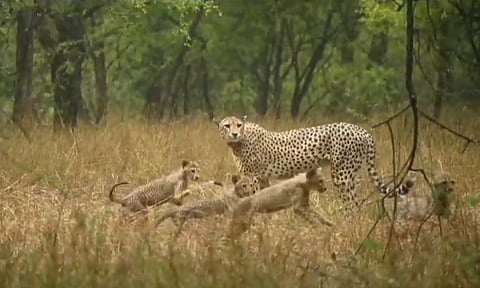

In a letter addressed to the Union Minister for Environment, Forest and Climate Change (MoEFCC) Bhupender Yadav, wildlife activist Ajay Dubey from Bhopal has highlighted serious concerns over the management of the Cheetah Project at Kuno National Park (KNP), Madhya Pradesh.
The letter, which has also been sent to the secretary of MoEFCC and the member secretary of the National Tiger Conservation Authority (NTCA), outlined multiple alleged irregularities in the project and called for urgent intervention.
Dubey’s letter points out several violations of the Wildlife Protection Act, 1972 and highlighted what he claims to be gross negligence on the part of the Kuno National Park’s authorities, particularly naming Uttam Sharma, director of the Lion Project and divisional forest officer of KNP. He has called for the immediate removal of Sharma and a special investigation team to be formed to ensure an impartial probe into the project’s failings.
In his letter, Dubey, who is from Bhopal, MP, outlined several key concerns regarding the management of cheetahs in Kuno National Park. First, he alleges that the cheetahs were excessively tranquilised — 110 times — without the required approval from the chief wildlife warden (CWLW), which he stated is a violation of Schedule 1 of Section 11 of the Wildlife Protection Act. Dubey also claimed that no records were maintained of these actions, further compounding the issue.
Additionally, he raised the case of cheetah Pawan, who died recently, alleging that it was illegally tranquillised and that this may have directly led to its demise. Dubey suggested that similar negligence might be responsible for the deaths of other cheetahs in the park.
He also pointed to violations of the NTCA’s standard operating procedure, particularly the failure to conduct videography during the post-mortems of deceased cheetahs, raising concerns about transparency in the investigation of these deaths.
Furthermore, Dubey expressed doubts over the park’s claims of continuous health monitoring, citing the presence of ticks on cheetah cubs as evidence of poor care. Lastly, he alleged that numerous samples were taken from the cheetahs without proper approval and that the findings from these samples were neither shared with the NTCA nor with the CWLW, indicating a potential breach of protocol.
The activist urged the MoEFCC to take decisive action to save the project by removing Sharma from his position and launching an impartial investigation into the operations at Kuno National Park.
The cheetah introduction project, initiated in 2022, has faced ongoing controversy since its inception. A total of eight cheetahs from Namibia and 12 from South Africa were brought to India in two phases between 2022 and 2023. So far, four litters, resulting in 17 cubs, have been born on Indian soil, with 12 surviving. Of the adult cheetahs, four from Namibia and eight of the 12 from South Africa remain alive.
A report by Down To Earth in July 2024 had highlighted how after nearly two years of bringing cheetahs from Africa to India, 26 of them, including 13 sub-adults and cubs, were still waiting to be released into the wild.